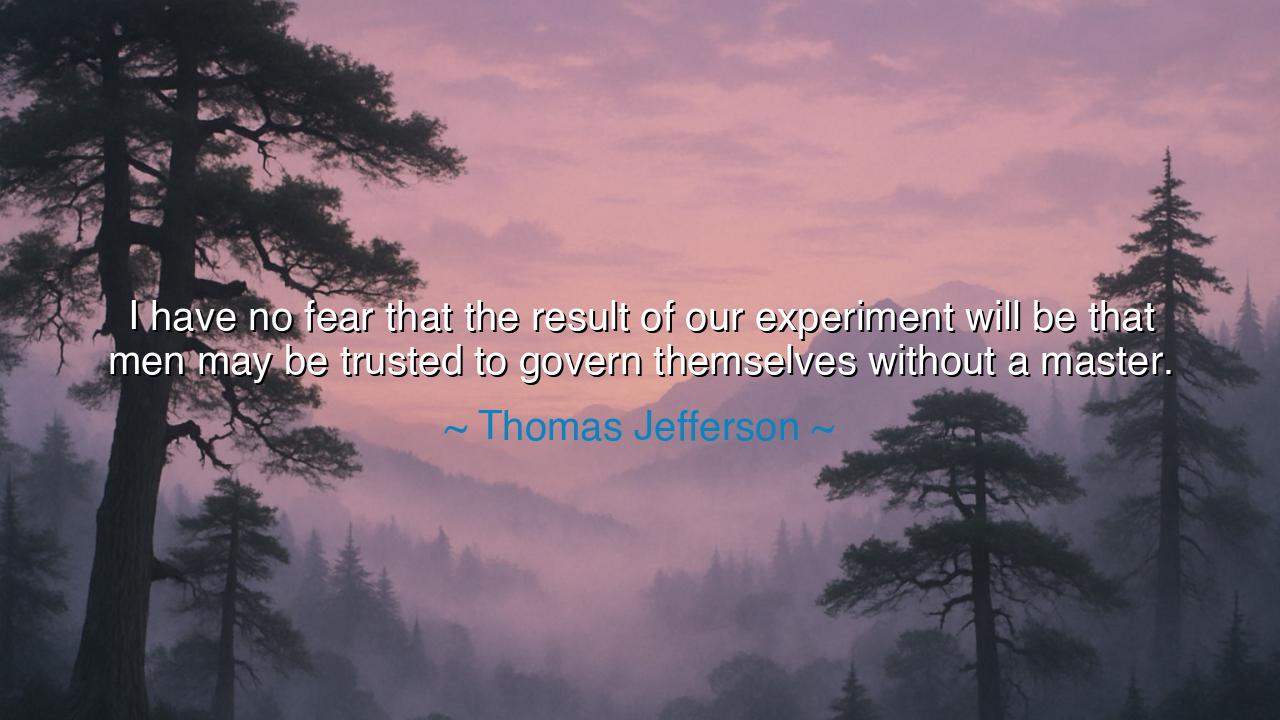
I have no fear that the result of our experiment will be that
I have no fear that the result of our experiment will be that men may be trusted to govern themselves without a master.






The words of Thomas Jefferson—“I have no fear that the result of our experiment will be that men may be trusted to govern themselves without a master”—resound like a trumpet from the dawn of liberty. These words, though spoken centuries ago, still carry the fire of freedom within them. Jefferson was no idle dreamer; he was a builder of nations, a scribe of independence, a prophet of democracy. In this utterance, he declares his unwavering faith in mankind: that men, given the chance, need not bow eternally beneath the yoke of kings, but can chart their own course, shaping a destiny guided by wisdom, virtue, and the voice of the people.
In the ancient manner, let us speak of the origin of these words. Jefferson’s vision was not born in comfort, but in the midst of struggle, when a new nation sought to break its chains from a distant monarch. The experiment of which he spoke was none other than the creation of a republic, a daring venture unseen on such a scale since the fading glories of Greece and Rome. He and his brethren, with pens sharper than swords, drafted the Declaration of Independence, proclaiming that all men are created equal, and that governments derive their just power from the consent of the governed. This was the seed of the great experiment: a world where men are not subjects, but citizens, entrusted with their own liberty.
History, too, bears witness to this truth. Recall the tale of George Washington, who, after leading the armies of America to victory, was offered the crown of kingship. He could have ruled as a monarch, yet he refused, laying down his sword and returning to his farm at Mount Vernon. In so doing, he gave flesh to Jefferson’s belief that self-government was not a wild fantasy, but a noble reality. Washington proved that a people need not a master, but only leaders who understand themselves as servants of the common good. His humility was more heroic than any conquest, for it showed that true greatness lies in the restraint of power.
Yet Jefferson’s confidence was not naive. He knew the frailties of men—the temptations of tyranny, the corruption of greed, the blindness of ambition. But he also believed in the counterforce of reason, virtue, and the will of the people, when cultivated in freedom. He foresaw that mistakes would be made, that struggles would arise, and that liberty itself would often tremble on the edge of ruin. Still, he declared, “I have no fear,” for he trusted that the collective spirit of a free people would rise again, correcting itself, stronger for its trials, more steadfast in its pursuit of justice.
This truth shines even in later ages. Think of India, casting off the rule of empire under the vision of Gandhi, whose weapon was not the sword but the unyielding will of the people. Millions, governed not by fear of a master but by unity of purpose, stood against the might of empire and prevailed. Their triumph echoed Jefferson’s creed: that when men are entrusted with their own destiny, guided by conscience and courage, they can forge nations out of oppression, and shape peace out of bondage.
The lesson is clear: liberty is not sustained by rulers, but by the character of the people. To govern oneself is no small task; it requires discipline, vigilance, and a spirit unafraid of responsibility. Those who demand freedom must also embrace duty, for the two are bound like shadow and flame. Without virtue, liberty decays into chaos. Without wisdom, freedom falls into folly. But when men and women walk in the balance of liberty and responsibility, they prove Jefferson’s vision true: they need no master but the voice of justice written upon their hearts.
Therefore, let every generation practice this truth in their own lives. Let the citizen not sit idle, but seek knowledge, that he may judge wisely. Let him engage in the affairs of his community, not as a complainer from the shadows, but as a builder of the common good. Let him defend truth, even when costly, for truth is the guardian of liberty. And let him teach his children that freedom is not a gift to be consumed, but a trust to be protected.
Thus, the quote is not a relic of Jefferson’s age, but a living torch passed down through the centuries. It calls to each of us: to rise above fear, to embrace the noble experiment of self-government, and to prove with our lives that humanity can indeed be trusted with its own destiny. And if we live so, the chains of tyranny, in any age and in any land, shall never again find a lasting home among us.






AAdministratorAdministrator
Welcome, honored guests. Please leave a comment, we will respond soon